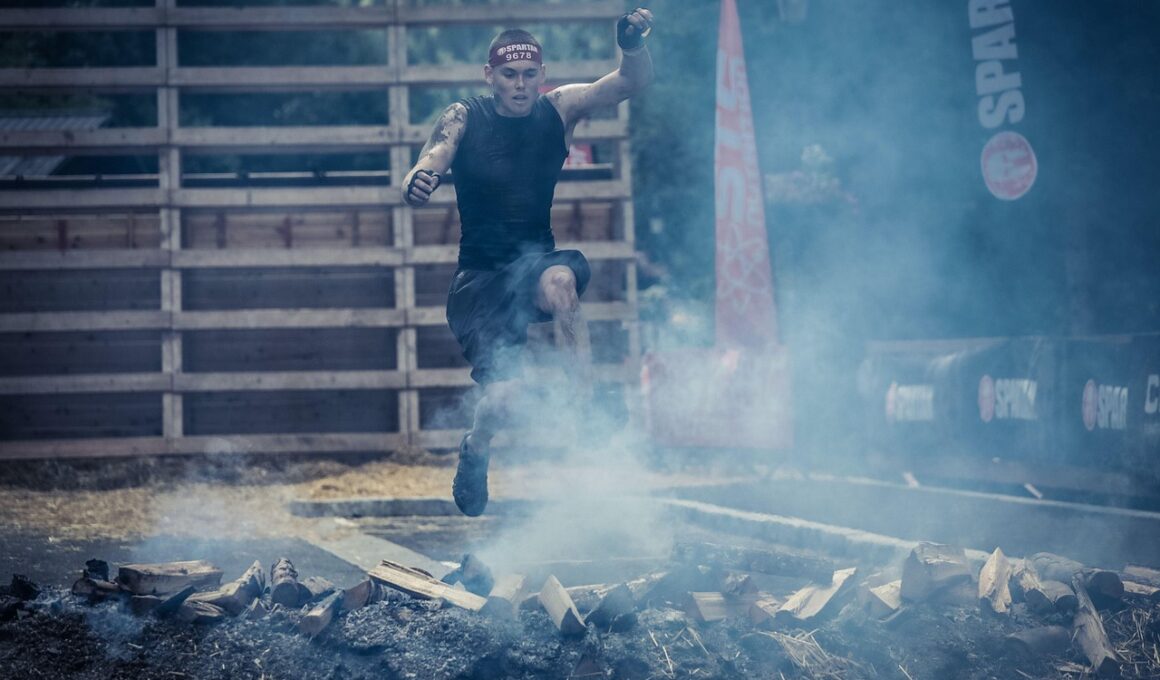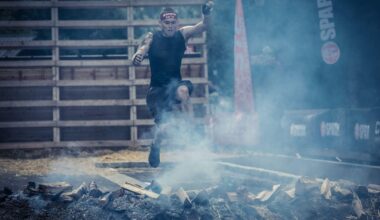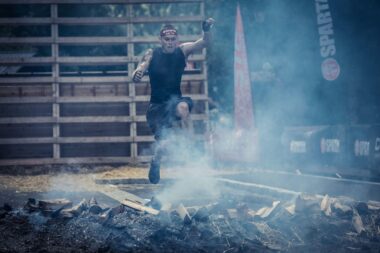Functional Training and Core Strength: Preparing for Obstacle Course Racing
Participating in an obstacle course race (OCR) requires a unique blend of strength, agility, and endurance. Functional training serves as the ideal preparation method, as it emphasizes training movements essential to daily activities and sports. Strengthening your core is paramount, as it stabilizes your entire body during dynamic movements. Incorporating exercises like planks, kettlebell swings, and medicine ball throws can effectively enhance your core strength. These exercises will not only build your abdominal muscles but also engage your back, shoulders, and legs. A strong core provides the necessary support for maneuvering obstacles like walls, muddy terrain, and rope climbs. As you progress in your training, focus on integrating movements that mimic the challenges of an OCR. This comprehension of functional fitness translates your gym work into real-world performance. Also, seeking guidance from professionals familiar with OCR training can accelerate your progress, ensuring you are employing the right techniques. Nutrition plays a critical role as well; eating whole foods can fuel your workouts, promote muscle repair, and help prevent injuries, improving your overall performance each race day.
Focusing on specific exercises can optimize your training regimen for an OCR event. Start with bodyweight exercises such as push-ups, burpees, and lunges which integrate the core while enhancing strength and coordination. You can incorporate equipment like resistance bands or dumbbells for additive resistance. Additionally, engaging in plyometric movements, such as box jumps and broad jumps, is essential for developing explosive power and enhancing your speed. Never underestimate the importance of maintaining proper form. Weaknesses in squat stances or deadlift postures can lead to imbalances, increasing your risk of injury. Moreover, practice running with a weighted vest or a backpack filled with sand to simulate race conditions, thereby enhancing endurance. Schedule your workouts, ensuring you have balanced sessions dedicated to strength, cardio, and mobility. Incorporate interval training into your running to simulate the different energy demands of an obstacle course race. Lastly, recovery is just as important; daily stretching sessions can help maintain flexibility, preventing injuries and aiding in muscle recovery. Remember, consistency is vital for success; stay committed to your training plan and monitor your progress closely.
Core Strength Exercises for Optimal Performance
There is a variety of effective core-strengthening exercises tailored for OCR preparation. Start with the classic plank, holding a straight line from head to heels for as long as possible, gradually increasing your time. Variations like side planks and plank jacks can target all areas of your core effectively. Another valuable exercise is the dead bug, which enhances coordination and engages your stabilizers. Additionally, Russian twists improve rotational strength, mimicking motions you’ll experience on the course. To improve your overall strength further, add in weighted exercises such as barbell squats and overhead presses. These compound movements not only promote core stability but also enhance overall body strength and muscular endurance. Aim to create a balanced routine that works various muscle groups, ensuring you rotate through different exercises adequately. Additionally, employing gymnastic movements, like hanging leg raises, challenges your core significantly, improving your grip strength, essential for obstacle climbing. Consistency in repetition and increasing challenge through weights or time is key to achieving your desired capabilities, allowing for confident performance during your OCR experience.
Nutrition and hydration are crucial components for training and performance in OCR specifically. To fuel your functional training workouts, opt for complex carbohydrates, lean proteins, and healthy fats to maintain energy levels. Incorporating foods such as oatmeal, quinoa, chicken, fish, and avocados allows for sustained energy. Staying hydrated is just as important; proper fluid intake can drastically improve performance and recovery. Aim to drink water throughout your training, and consider electrolyte replacements for long-duration workouts. Don’t forget the importance of meal timing; consuming a balanced meal or snack before and after workouts can facilitate energy restoration and muscle recovery. Post-workout protein shakes made with whey or plant-based proteins can maximize muscle repair. Moreover, aim for a variety of nutritious foods to ensure adequate intake of vitamins and minerals, which are essential in muscle health and supporting metabolic function. Consult a certified nutritionist for personalized meal plans that cater to your specific needs and objectives. Combining proper diet with training can significantly heighten your fitness levels, leading to exceptional performance in your upcoming obstacle course race.
Mental Preparation and Strategy
No discussion on preparing for obstacle course racing would be complete without addressing the mental aspect of training. Mental toughness is as important as physical readiness; developing a winning mindset can significantly enhance your performance. Focus on visualizing the obstacles you’ll encounter and mentally rehearsing your approach to tackling them. This technique can help alleviate pre-race anxiety, boosting your confidence on race day. Moreover, setting SMART (Specific, Measurable, Achievable, Relevant, Time-Bound) goals for training can keep you motivated and organized in your preparation process. Breaking down larger goals into smaller milestones can help articulate progress, maintain motivation, and inspire continuous enhancement. Incorporate mindfulness techniques such as meditation or breathing exercises to reduce stress and enhance concentration. Practicing gratitude can foster a positive attitude, promoting resilience in completing challenging workouts. Share your aspirations and experiences with fellow athletes to build a supportive network; camaraderie can enhance your journey and make the training process enjoyable. Remember that failure is a part of the journey; embrace challenges as learning opportunities, allowing for growth and improvement in both physical and mental arenas.
Recovery methods are essential after rigorous training sessions for obstacle course racing. Always prioritize your recovery to reduce injury risks and optimize improvements. Incorporating techniques like foam rolling and stretching allows for muscle relaxation and tension relief, ensuring better mobility in the long term. Commit to a minimum of one rest day per week to allow your muscles adequate time to heal and rebuild; this is critical in preventing burnout or overtraining. Additional recovery strategies include techniques such as massages, both self-administered or professional, which help improve circulation and reduce soreness following intense workouts. Consider employing hydrotherapy, contrast baths, or ice baths after long and demanding training days. Nourishing your body with wholesome foods, focusing on high-protein snacks post-exercise, is also essential for recovery. Sleep is another critical aspect to prioritize; any athlete should aim for at least seven to nine hours of quality sleep each night to promote overall recovery. Reflect on your training experiences regularly, noting areas of improvement, or adjustments necessary for your plan. This ongoing evaluation can make your preparation more effective, continually preparing you for the exciting challenges of OCR.
Conclusion: Embrace the Challenge
As you embark on your journey towards successful obstacle course racing, embrace the principles of functional training and core strength. These components lay the foundation for an adequately prepared athlete, capable of tackling various physical challenges. Nutrition, mental strategies, and adequate recovery only enhance your overall performance. The diversity of challenges offered by OCR presents an opportunity to develop a wide range of physical and mental skills. Develop your physical fitness through a multifaceted training approach, emphasizing strength, agility, endurance, and mental resilience. This will elevate not only your OCR experience but also many other aspects of your life. Remember to celebrate your small victories in training, as they contribute significantly to your larger goals. Cultivate a supportive community around you to share knowledge and motivation, helping you to push through barriers. By focusing on functional training, you will create stronger, well-rounded skills applicable in various scenarios encountered during OCR. Lastly, always keep your eyes on the prize, remain enthusiastic about this thrilling sport, and witness your growth as you prepare for your next biggest race!





